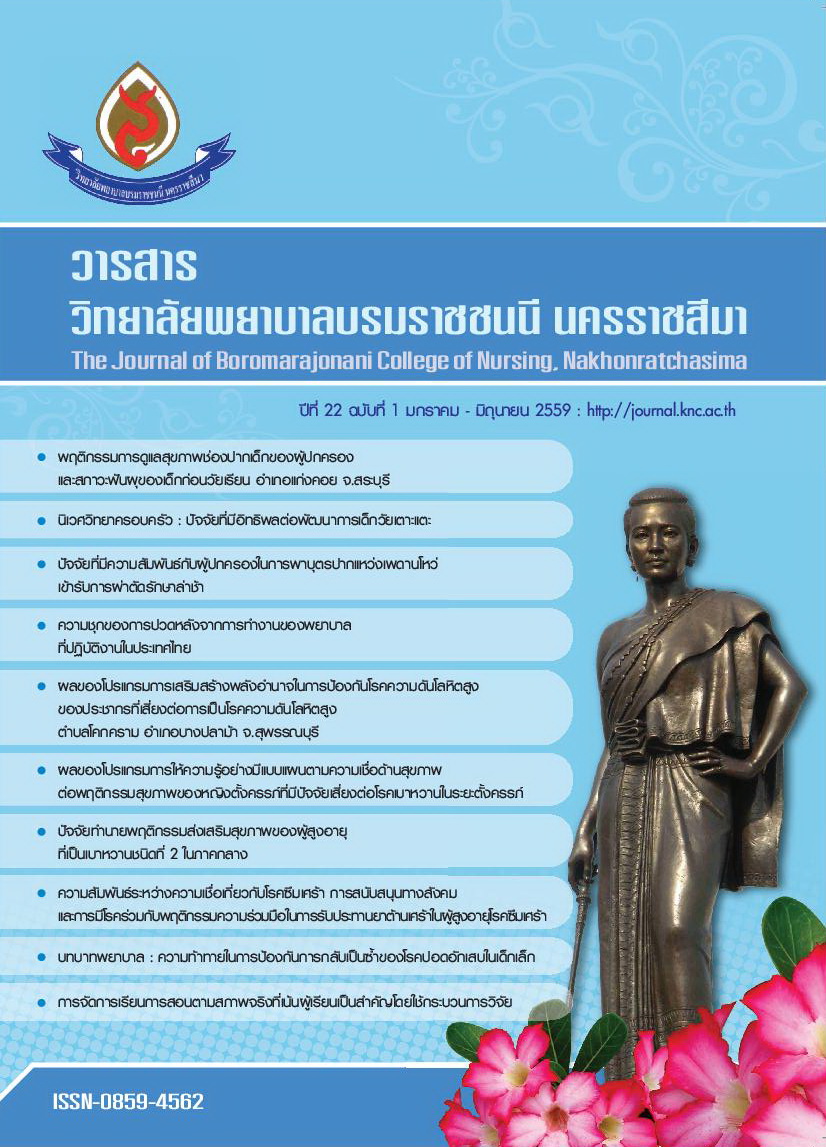ความสัมพันธ์ระหว่างความเชื่อเกี่ยวกับโรคซึมเศร้า การสนับสนุนทางสังคม และการมีโรคร่วมกับพฤติกรรมความร่วมมือในการรับประทานยาต้านเศร้าในผู้สูงอายุโรคซึมเศร้า
คำสำคัญ:
ความเชื่อเกี่ยวกับโรคซึมเศร้า, การสนับสนุนทางสังคม, การมีโรคร่วมพฤติกรรมความร่วมมือในการรับประทานยา, belief about depression, social support, medical co-morbidity, drug adherence behaviorบทคัดย่อ
การวิจัยครั้งนี้มีวัตถุประสงค์เพื่อศึกษาความสัมพันธ์ระหว่างความเชื่อเกี่ยวกับโรคซึมเศร้า การสนับสนุนทางสังคมและการมีโรคร่วม กับพฤติกรรมความร่วมมือในการรับประทานยาต้านเศร้าในผู้สูงอายุโรคซึมเศร้า โดยใช้แนวคิดความเชื่อด้านสุขภาพ (Health Belief Model) ของ Rosenstock (1974) เป็นกรอบแนวคิดในการศึกษา กลุ่มตัวอย่างเป็นผู้สูงอายุโรคซึมเศร้าที่ได้รับการรักษาด้วยยาต้านเศร้า และมีโรคเรื้อรังทางกายร่วมด้วย เข้ารับการรักษาที่แผนกผู้ป่วยนอก โรงพยาบาลจิตเวชนครราชสีมาราชนครินทร์และโรงพยาบาลมหาราชนครราชสีมา จำนวน 85 ราย เครื่องมือในการวิจัยได้แก่ แบบสอบถามความเชื่อเกี่ยวกับโรคซึมเศร้า แบบสอบถามเกี่ยวกับแหล่งสนับสนุนทางสังคมแบบสอบถามจำนวนโรคทางกาย แบบสอบถามพฤติกรรมความร่วมมือในการรับประทานยา วิเคราะห์ข้อมูลด้วยสถิติพรรณนาและค่าสัมประสิทธิ์สหสัมพันธ์ของสเปียร์แมน
ผลการวิจัยพบว่า กลุ่มตัวอย่างเป็นเพศหญิงร้อยละ71.8 มีอายุระหว่าง60 - 69 ปีร้อยละ74.1สถานภาพสมรสหม้าย ร้อยละ 57.6การศึกษาชั้นประถมศึกษา ร้อยละ 68.2 ผลการวิเคราะห์ความสัมพันธ์พบว่า ความเชื่อเกี่ยวกับโรคซึมเศร้า การสนับสนุนทางสังคมมีความสัมพันธ์กับพฤติกรรมความร่วมมือในการรับประทานยาต้านเศร้าในผู้สูงอายุโรคซึมเศร้าอย่างมีนัยสำคัญทางสถิติ (rs = 0.28, p =0.01; rs = 0.22, p = 0.04) ตามลำดับ แต่การมีโรคร่วมมีความสัมพันธ์กับพฤติกรรมความร่วมมือในการรับประทานยาต้านเศร้าในผู้สูงอายุโรคซึมเศร้าอย่างไม่มีนัยสำคัญทางสถิติ (rs = 0.09, p = 0.42)
ข้อเสนอแนะ พยาบาลควรจัดกิจกรรมบำบัดเพื่อส่งเสริมความเชื่อเกี่ยวกับโรคซึมเศร้าและการบำบัดรักษาที่ถูกต้อง รวมทั้งส่งเสริมให้ครอบครัวเข้ามามีส่วนร่วม ในการดูแลสนับสนุนพฤติกรรมความร่วมมือในการรับประทานยา
Correlation between Beliefs about Depression, Social Support, Medical Co-Morbidity and Drug Adherence Behavior in Elderly with Major Depressive Disorder
Abstract
The present study aimed at investigating the relationships between beliefs about depression, social support, and medical co-morbidity and drug adherence behavior in elderly persons with major depressive disorder.The Health Belief Model of Rosenstock (1974) was employed as the conceptual framework of the study.The study sample consisted of 85people over 60 years old with major depressive disorders who were treated with antidepressants and who also had a medical co-morbidity. The instruments used in the data collection consisted of a questionnaire regarding depression, a social support questionnaire, a medical co-morbidity questionnaire, and a drug adherence behavior questionnaire. Data was analyzed by means of descriptive statistics and Spearman’s rank correlation coefficient.
The study findings revealed that 71.18 % of the subjects were female, 74.1% ranged in age from 60 to 69 years old, 57.6%werewidowed, and 68.2% completed elementary education. Considering the relationships among study variables, it was found that beliefs about depression and social support were related to drug adherence behavior in elderly persons with major depressive disorders with statistical significance of rs= 0.28, p = 0.01; rs = 0.22, p = 0.04, respectively. However, medical co-morbidity was associated with drug adherence behavior in elderly persons with major depressive disorders with no statistical significance of rs= 0.09, p = 0.42.
Based on the findings, it was recommended that nurses should conduct therapiesto promote accurate and appropriate beliefs about depression and its treatment. Moreover, nurses should encourage family participation in supporting drug adherence behavior of the patients.
ดาวน์โหลด
ฉบับ
ประเภทบทความ
สัญญาอนุญาต
บทความที่ได้รับการตีพิมพ์เป็นลิขสิทธิ์ของ วารสารสุขภาพและการศึกษาพยาบาล ซึ่งดำเนินการโดยวิทยาลัยพยาบาลบรมราชชนนี นครราชสีมา
ข้อความที่ปรากฏในบทความในวารสารเล่มนี้เป็นความคิดเห็นส่วนตัวของผู้เขียนแต่ละท่านไม่เกี่ยวข้องกับกองบรรณาธิการวารสารสุขภาพและการศึกษาพยาบาล หรือวิทยาลัยพยาบาลบรมราชชนนี นครราชสีมา แต่อย่างใด ความรับผิดชอบองค์ประกอบทั้งหมดของบทความแต่ละเรื่องเป็นของผู้เขียนแต่ละท่าน หากมีความผิดพลาดใดๆ ผู้เขียนแต่ละท่านจะรับผิดชอบบทความของตนเองแต่ผู้เดียว







